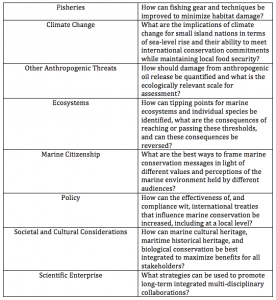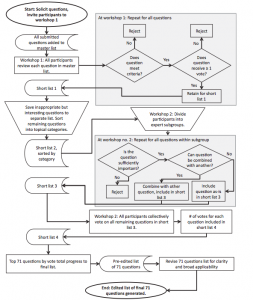71 Questions: A Guide for Marine Conservation
By James Keegan, RJD Intern
The ocean remains an immense resource for humanity, providing food, economic activity, and cultural roots for many. Although these resources are valuable, it is difficult to effectively protect them because our knowledge of marine ecosystems is lacking. To correct this insufficient understanding of the marine environment, Parsons et al. 2014 conducted two workshops in order to establish a list of important questions that would help direct conservation research. If conservationists can answer these questions, the community’s ability to conserve and mange the world’s marine resources would substantially improve. With the contributions from participants in the fields of science, conservation, industry, and government, Parsons et al. 2014 identified 71 key questions for the preservation of the marine environment. They then grouped these questions into 8 categories, each associated with an aspect of marine conservation: fisheries, climate change, other anthropogenic (human caused) threats, ecosystems, marine citizenship, policy, societal and cultural considerations, and scientific enterprise. Using these questions as guidelines, funders and researchers can develop programs that can greatly benefit marine conservation.
Because oceans are vast, and their environments difficult to access, marine research is expensive and difficult to undertake. Expensive technologies necessary for accessing marine environments, like submersibles, raise costs beyond those typically incurred by terrestrial, or land-based, studies. Moreover, marine conservation research receives funding at a much lower rate than terrestrial conservation. In order to combat these issues, Parsons et al. 2014 sought out to identify a set of questions that, if answered, would contribute immensely to conserving marine ecosystems on a global scale, thus maximizing the returns of the research programs involved. By prioritizing the most important questions facing marine conservation, conservationists can more effectively protect the marine environment with the funding they receive.
In order to produce their list of key questions, Parsons et al. 2014 conducted a pair of workshops. In their first workshop, held during the second International Marine Conservation Congress (IMCC), 17 participants with varying expertise reviewed an initial list of 631 questions. Parsons et al. 2014 solicited these initial questions from participants at IMCC, professional peer groups, and the Society for Conservation Biology. The 17 participants reduced the number of questions to 316, and Parsons et al. 2014 voted on these remaining questions in their second workshop, ultimately reducing the number to 71. Finally, they grouped these 71 questions into 8 categories: fisheries, climate change, other human produced threats, ecosystems, marine citizenship, policy, societal and cultural considerations, and scientific enterprise.
Each of the 8 categories pose challenges to marine conservationists. Mass extraction of fish and other organisms stress marine ecosystems and can lead to overexploitation. Components of climate change, like warmer waters and ocean acidification, directly affect marine species and indirectly affect ecological interactions. Other human activities negatively impact marine ecosystems, like fertilizer runoff creating oxygen-depleted areas in the ocean, or global shipping routes introducing invasive species into new areas. Because conducting research in the marine environment can be difficult, marine ecosystem processes and population dynamics are poorly understood. The behavior and lifestyle choices of individual citizen’s significantly impact the health of the marine environment, but the best methods for engaging the public and promoting marine conservation remain illusive. Marine conservation and resource use policy are challenging because marine policy encompasses both the lack of information on marine systems and complex governance issues. Moreover, marine conservation is closely tied with socioeconomic and cultural factors, requiring engagement in such areas with targeted research. Scientific culture itself needs reworking, in that data sharing, collaboration, and funding for fields like taxonomy need to improve. With so many issues facing marine conservation, the questions articulated by Parsons et al. 2014 will help focus the conservation effort.
Past ecological prioritization exercises underemphasized marine issues, so Parsons et al. 2014 highlighted the specific challenges facing marine conservation. Although these questions have not been answered completely, people can, and should, undertake reasonable conservation efforts regarding their subject matter. By serving as a guide for scientific research, these 71 questions, along with evidence-based, participatory, and transparent management, can lead us towards effective marine conservation.
References:
Parsons, E. C. M., Favaro, B., Aguirre, A. A., Bauer, A. L., Blight, L. K., Cigliano, J. A., Coleman, M. A., Côté, I. M., Draheim, M., Fletcher, S., Foley, M. M., Jefferson, R., Jones, M. C., Kelaher, B. P., Lundquist, C. J., McCarthy, J.-B., Nelson, A., Patterson, K., Walsh, L., Wright, A. J. and Sutherland, W. J. (2014), Seventy-One Important Questions for the Conservation of Marine Biodiversity. Conservation Biology, 28: 1206–1214. doi: 10.1111/cobi.12303





Leave a Reply
Want to join the discussion?Feel free to contribute!